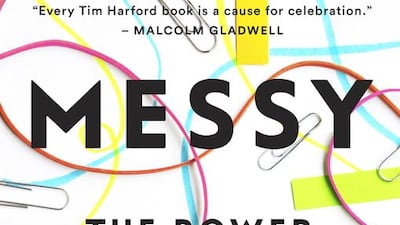A place for everything and everything in its place. Not quite so, says economist and journalist Tim Harford in new book Messy. He says that sometimes the best place is on a messy desk – and then into the bin rather than filed away.
Happy-go-lucky “pilers” do better than filers, he says. A desk is a dynamic object and things need to sit a while before you know what the right place is.
So piling up the desk with papers creates a natural filing system, where rules and useful, regularly accessed documents stay close to the top. Sporadically, you can just take the bottom half of the pile and dump it.
Even creating virtual folders in email is useless, Harford says, because filers file too early, before they really know how they will use information in the future, leading to “failed folders” containing just one or two emails. Just searching your emails produces more efficient results.
You may also miss out on the creative inspiration that comes from an artfully messy space, says Harford, referencing the Massachusetts Institute of Technology’s Building 20.
A “dusty firetrap”, this supposedly temporary structure was built during the Second World War but became a messy “garden shed” of a space for 50 years, incubating the first atomic clock, the first graphic arcade game and the first Bose speakers.
Messy also means improvisation, says the Financial Times columnist – and the new master is Donald Trump.
Mess can be used as a weapon to create chaos, Harford says: just what the new president-elect Trump has been doing recently with his late-night tweets and attention-grabbing comments.
A messy desk equalling a creative mind is not a new theory, and Harford happily admits he’s a tidy person who was “self-medicating” in writing this book. But it makes for an easy read, with lots of engaging stories to make your case if you’re minded to be messy.
If you’re not, it may persuade you to leave that wayward pen on your desk.
Messy: How to Be Creative and Resilient in a Tidy-Minded World is published in hardcover by Riverhead Books, and costs US$13.60 from Amazon.co.uk.
q&a winging it really can work
Suzanne Locke offers more insights from Tim Harford's Messy:
Any creative way I can make people read my reports?
Use “messy” fonts to grab your colleagues’ attention, claims Harford. He cites a study by psychologists that got teachers to reformat their teaching handouts using three unusual fonts – the “dense” Haettenschweiler, the “florid” Monotype Corsiva or the “zesty” Comic Sans italicised. The fonts made students slow down and think about what they were reading, ending up with higher scores than students reading standard fonts in the same handouts.
Is preparation worthwhile when I’m due to present a report or speak publicly?
If you follow the story of Martin Luther King, no. King had just 15 minutes to prepare before speaking to thousands of protesters at the march. It led to him throwing away his prepared notes when he gave his I Have a Dream speech in 1963.
Should I follow my office’s rules on tidiness?
Harford gives the example of a 2010 study by psychologists at the University of Exeter. They created four office layouts: a “lean” (spartan) office; an “enriched” space with pictures and plants; an “empowered” office, where workers could arrange their own decorations; and a “disempowered” office, where the psychologists rearranged that space. Those working in the empowered office got 30 per cent more done than in the lean, and 15 per cent more than in the enriched space. But those in the disempowered office had the lowest productivity.
business@thenational.ae
Follow The National's Business section on Twitter

